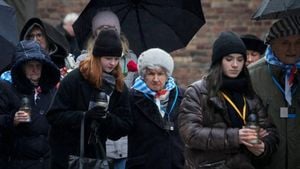Belarus stands on the brink of its presidential elections on January 26, 2025, with the long-time leader Alexander Lukashenko poised to reclaim his position amid concerns of significant electoral manipulation and suppression of dissent. This election marks another chapter of Lukashenko's persistent grip on power, seeking to achieve what would be his seventh consecutive term, which many claim is not only predetermined but also lacks genuine competitiveness.
The atmosphere leading up to the elections starkly contrasts with democratic norms. The political climate is tightly controlled, with independent media having been all but eliminated, making way for state-run narratives only. Reports from various sources indicate Lukashenko’s government has deliberately engineered this election environment to discourage any form of protest or opposition.
Despite the apparent lack of credible opposition, several figures are formally challenging Lukashenko. Notably, Svetlana Tikhanovskaya, who has been abroad since the protests following the disputed 2020 elections, continues to be recognized as leading the opposition from exile. Others like Viktor Babariko, once poised as Lukashenko's main rival, remain imprisoned under politically motivated charges. Tikhanovskaya has urged Belarusian citizens to vote against the regime, stating, "I do not wish to see people sacrifice their freedoms without purpose." This resistance remains symbolic, as actual voter mobilization appears nearly impossible under repressive measures.
International observers and organizations are skeptical about the legitimacy of the upcoming elections. Kaja Kallas, the EU foreign affairs chief, characterized the electoral process as mere theater, noting, "We are bracing ourselves for protests," reflecting solidarity with potential dissenters within Belarus.
Lukashenko himself has made statements to the media asserting the choice is purely for the Belarusian people, emphasizing, "This election is for our citizens, not dependent on international opinions." His rhetoric suggests confidence, yet it belies the harsh reality faced by most Belarusians, who continue to live under the weight of repression and fear of retaliation.
Critics argue this election serves merely to reinforce Lukashenko's power as he aims to promote the narrative of legitimacy through illusory competition. His administration has even invited choice observers, but not the Organization for Security and Co-operation in Europe (OSCE), which has refused to send representatives due to the insufficient notice for observation, undermining any semblance of credible oversight.
Looking at the broader consequences of these elections, many citizens appear disillusioned. Opinion polls suggest minimal enthusiasm, and there is growing sentiment among Belarusians for change but fear seems to override hope for fair elections.
While officials project optimism, the atmosphere is laden with tension, caution, and apprehension. The elections scheduled for January 26, 2025, will be closely watched, not only for their immediate outcomes but also for their potential to stir the long-simmering dissatisfaction within the populace and whether this will spark any grassroots movement against the regime.
Belarus has already weathered severe repression, particularly after the violent crackdown following the 2020 elections. Estimates suggest thousands of Belarusian citizens have been exiled, and major opposition figures remain either detained or out of reach. A staggering number of political prisoners still languish behind bars as dissent is met with harsh retributive measures, indicating Lukashenko’s regime remains unyielding even as international scrutiny heightens.
Historically, Lukashenko's grip on power has been closely tied to his alliance with Russian President Vladimir Putin, as Belarus serves not just as a buffer for Moscow but also as fertile ground for Russian influence within Eastern Europe. The regime’s tactics of control have metastasized from mere political repression to almost totalitarian practices, effectively isolationalizing Belarus from the Western world.
The upcoming election may be framed as yet another rehearsal for power consolidation by Lukashenko, yet the current political reality is stark. While the regime tries to project stability and strength, underlying currents of discontent reflect simmering frustrations among the populace. What remains is to witness how deeply rooted these frustrations are and whether they can one day coalesce around genuine avenues for change.
Only time will reveal whether the Belarusian people can mobilize for accountability against Lukashenko's regime, or whether this election will merely continue what has become a bitter saga of lost potential for democracy and dignity.



